|
Haftarah Shabbat Zahor: 1 Samuel 15:1-34 Shabbat Zahor - the Shabbat of RemembranceOn the Shabbat before Purim, Jews throughout the world will turn their attention to two special readings in Deuteronomy and Samuel, describing how the ancient nation of Amalek attacked our ancestors in the desert. These readings come before Purim because Haman was the descendent of Agag, King of Amalek. Deuteronomy 25:17-19: “Remember what Amalek did to you by the way, when you came out of Egypt. How he met you by the way, and struck at your rear, all who were feeble behind you, when you were faint and weary; and he did not fear God. Therefore it shall be, when the Lord your God has given you rest from all your enemies around, in the land which the Lord your God gives you for an inheritance to possess, that you shall blot out the remembrance of Amalek from under heaven; you shall not forget it.” Not only was the attack unprovoked, but it came at a time when the people were faint and weary. Shabbat Zachor - the Sabbath of Remembrance - is so named because we are commanded to remember the heinous deeds committed by Amalek. Now, almost 3000 years later, we can add, remember what Hamas did to you on October 7th. Our memories as victims of violence and persecution are a two-edged sword, though. We sometimes find that many of our people have accumulated emotions of hate and vengeance against whoever belongs to a nation or group which has hurt us. We sometimes hear expressions of anger, following murderous attacks. Feelings of rage and the desire for revenge are natural and understandable in moments of crisis, and one cannot be judged in his or her moment of anguish. But it seems that this mitzvah has a different meaning, because the Torah does not “command” us to feel that which is naturally felt. The Torah does not enjoin us to love our children, for example, we do that naturally. On the other hand, it does charge us to “love the stranger.” With this commandment to remember the deeds of Amalek, Torah seems to command us to make every effort not to be contaminated by the actions like those of Amalek, or Hamas. Our response to violence must be swift and just, nothing more and nothing less, but tempered by mercy so that we do not stain our souls and minds with violence. As Golda Meir once said, “When peace comes we will perhaps in time be able to forgive the Arabs for killing our sons, but it will be harder for us to forgive them for having forced us to kill their sons.” Our God asked to “love your neighbor as yourself” and “love your enemies” but our mind, clouded by our sinful nature, cannot comprehend the full significance of this commandment, thus, at least we have to remember not to be like Amalek and Hamas and darken our souls by hate. Justice is enough. "YESHUA — THE LIGHT OF THE WORLD" The construction of the Mishkan having been completed, Torah turns to those who will lead the services in it: the Kohanim. So, in this Parashah, we read about the process of their selection, their vestments, and the inauguration service by which they would be sanctified as ministers of God. But, just as when God began the creation of the physical world with the command for light, so, too, God begins instructing the creation of the spiritual world with a command for a light, the Menorah. This light is to burn before the sons of Yisrael forever, from generation to generation. The Kohanim could not be consecrated to do their service without this light. Ve’atah te’tzaveh et benei Yisrael veyikchu eilecha shemen zayit zach katit lema'or leha'alot ner tamid. "And you shall command the sons of Yisrael, that they shall bring to you pure oil of crushed olive for illumination, to kindle the lamp continually.” Shemot 27:20 “In the Tent of Meeting, outside the Partition which is before the Testimony, Aharon and his sons shall keep it in order from evening to morning before Yehovah; [it shall be] a perpetual statute throughout their generations for the sons of Yisrael.” Shemot 27:21 This physical lamp, the Menorah, the seven-branch candelabra, was to be kindled continually, from evening until morning, every day, including the Shabbat. In the spiritual realm, King David tells us that the word of God written in the Torah is that lamp: “Your word is a lamp to my feet and a light to my path.” Ps. 119:105 and "For You are my lamp, o Yehovah; and Yehovah illumines my darkness.” Shmuel Bet (2 Samuel) 22:29 We are to kindle this spiritual lamp every day by reading the word of God. We need to be illuminated by His words every day, not just on Shabbat. Because through Torah God is talking to us; through it God is communicating His desires for us and in it we find the path to holiness. We need to read God's word with intentionality and purpose, to discover the character of God and His ethics, and to emulate them because He is Holy and He asked us to be holy too. This light was not intended only for the sons of Yisrael, though. Later in the Scriptures, in the book of Yeshayahu, God twice describes the Israelites as a “light unto the nations.” God asks the Jewish people to continue the work of this spiritual creation through a daily effort to spread His light unto other people, to spread the teaching of His word, the Torah. Further still, we find in the Brit Chadashah that the word of God becomes flesh in the Person of Yeshua and Yochanan tells us that: “He [Yeshua] was the lamp that was burning and was shining.” Yochanan 5:35 Thus, similarly, we are now to spread this “light” – Yeshua’s teachings – to everyone around us. With the advent of Yeshua, the physical Temple fulfilled its purpose and a new Temple was formed in which all believers are to be sanctified as ministers of God. But, just as the priests of old, so, we too, cannot begin our service without being illuminated and we cannot be His ministers without the guidance of the light of His word. We must read the Scriptures with a desire to know more. This beginning passage of the Parashah, Shemot 27, is full of spiritual meanings and the sages, zealous in basking in His light, gave us some interesting analogies. Here are some of them. — And you shall command “ve’atah te’tzaveh.” Why does Yehovah use the word "te’tzaveh" in preference to the more commonly used words "t’omar" and "te’daber"? The word "tzaveh" is related to the word "tzava'ah" — "a will." It is common for a parent to leave a will containing instructions for his children. Since Moshe was like a father to the Jewish people, thus, Yehovah is telling him, "There will be a time when you will not be physically with B'nei Yisrael, therefore, ve'atah te’tzaveh — you should leave the following instruction to be willed from generation to generation.” — They shall bring to you pure oil of crushed olive “veyikchu eilecha shemen zayit zach." Oil does not mix with any other liquid, but rather separates and rises to the top. This reminds the Jewish people that their calling as a “holy nation” is unique. They cannot mix the holy with the profane; they are to rise above it. So, too, the believers are instructed to separate themselves, not from the world, but from the sins of the world. We are called to be pure and holy. We are called to be an example to the world: “Therefore I want the men in every place to pray, lifting up holy hands, without wrath and dissension” (1 Timothy 2:8). Lift up holy hands and bring actions - mitzvoth, and words which are pure, which will illuminate the darkness that it is in the world. But why is the word “olive” in its singular form? In the literal sense, to obtain the purest oil for the Menorah of the Mishkan, the Israelis were pressing every olive individually. In the spiritual sense, we are individually called to bring our best. We are not to look of what other people are doing, but to do what it is right based on God's standards even if we are the only ones doing it. — Crushed for illumination "katit lema'or." The "or" represents the light of Torah, as stated in Proverbs 6:23, "Torah is light." In order to truly succeed in Torah study, one needs to "crush" oneself, one needs to dedicate to this effort the best time of the day. Also, the sages thought that: “When one speaks crushing words of rebuke, it must be with the sole purpose of enlightening, illuminating and uplifting one's fellow. Never, God forbid, to humiliate and break him.” How true are these words describing our Messiah: “A bruised reed He will not break and a dimly burning wick He will not extinguish” (Yashayahu 42:3). Yeshua did not come to judge us but to be “crushed” for us so we can be “illuminated.” With His compassionate words, He is encouraging every dimly burning wick to burn brighter, to be up-lifted, and to be a light to the world. — Pure olive oil, crushed for illumination. The Menorah is the prototype of spirituality. Not only it represents Torah but also the mitzvoth, the deeds we do based on God’s ethics, Ki ner mitzvah "A candle is a mitzvah" (Proverbs 6:23). There are people who plead poverty when they have to spend money for Torah and mitzvoth, but have plenty of money when it comes to personal matters. From the way things were done in the Mishkan, we can learn true priorities. For Torah and mitzvoth we should spend more of our resources and use the best and purest. For personal pleasure, one should practice restraint and learn to suffice with less. But not all men are alike. Yehovah does not expect one person to be like another, but He does expect one to achieve his or her utmost. The famous tzaddik Rabbi Zusha of Anipoli once said, "When I come before the Heavenly tribunal, I am not afraid they will demand of me, 'Why wasn't Zusha like the patriarch Avraham?' But I am afraid lest they ask me, 'Why wasn't Zusha as Zusha could have been?' " When we are going to appear in front of the judgment seat of Messiah are we going to also shrink because we have not done our utmost? “For we must all appear before the judgment seat of Messiah, so that each one may be recompensed for his deeds in the body, according to what he has done, whether good or bad.” (2 Corinthians 5:10) — To kindle a lamp continually "leha'alot ner tamid." The "lamp" represents the soul of the Jew, Ner Yehovah nishmat adam "The lamp of Yehovah is the soul of man." (Proverbs 20:27) The purpose of the Jew in this world is "leha'alot ner tamid" — to continually elevate his soul. The word "leha'alot" means, to kindle until the flame rises up by itself. Only if we are walking with God and are “kindled” every day with the light of His word our faith will be able to stand on its own and not be blown by every wind of false doctrine. — And you shall command ... to kindle a lamp continually. This passage instructs us about the kindling of the Menorah in the Mishkan and later in the Beit haMikdash. When Yehovah told Moshe to teach the instructions for building the Mishkan, He said: "Make for Me a Sanctuary that I may dwell among them" — "veshachanti betocham." Grammatically, it should have said, "that I will dwell in it" — "veshachanti betocho." Yehovah was hinting that He wants every Jew to make himself and his home a Sanctuary for Him, because He wants to dwell among them, not in a building. In the absence of the Beit haMikdash, the table in the Jewish home is compared to the altar for worship and study. The Shabbat candles parallel the Menorah, therefore, it is customary in all Jewish homes for mothers and daughters to light Shabbat candles. Even if the lighting of the Shabbat candles is not a biblical commandment, it is a beautiful symbolism of the promise of a home to be guided by the light of the word of God. Shabbat Shalom and Chag Purim Sameach! |
|


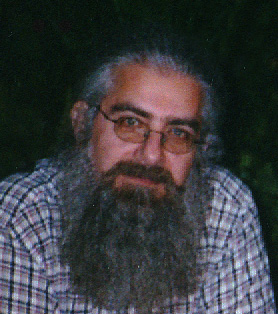
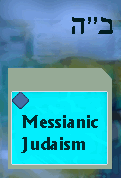 Is Messianic Judaism Biblical Judaism?
Is Messianic Judaism Biblical Judaism? 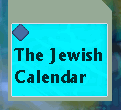 What is the Jewish Calendar?
What is the Jewish Calendar?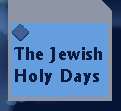 The Jewish Holy Days are the seven God's Holy Days.
The Jewish Holy Days are the seven God's Holy Days.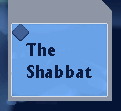 The Shabbat is the seventh day which God sanctified and set apart for worship.
The Shabbat is the seventh day which God sanctified and set apart for worship.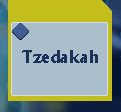 Tzedakah, the righteous giving.
Tzedakah, the righteous giving.